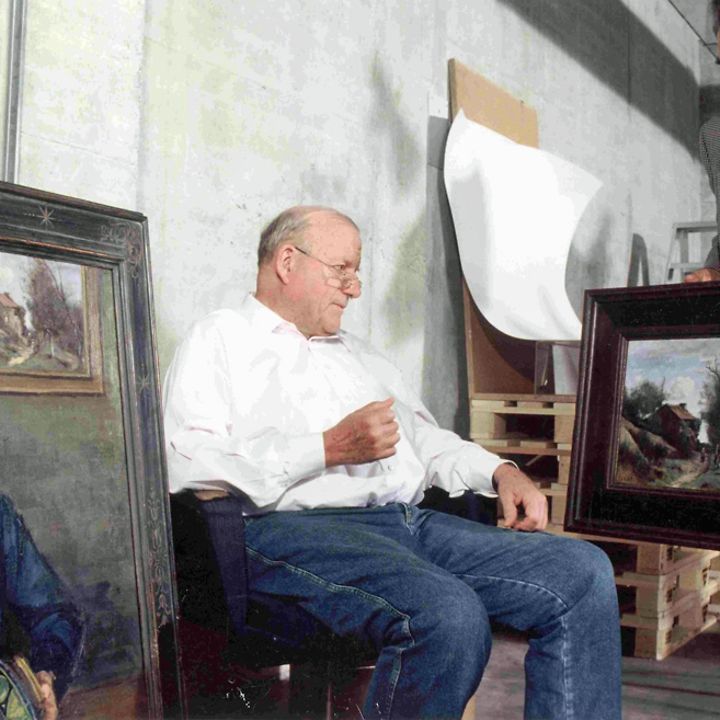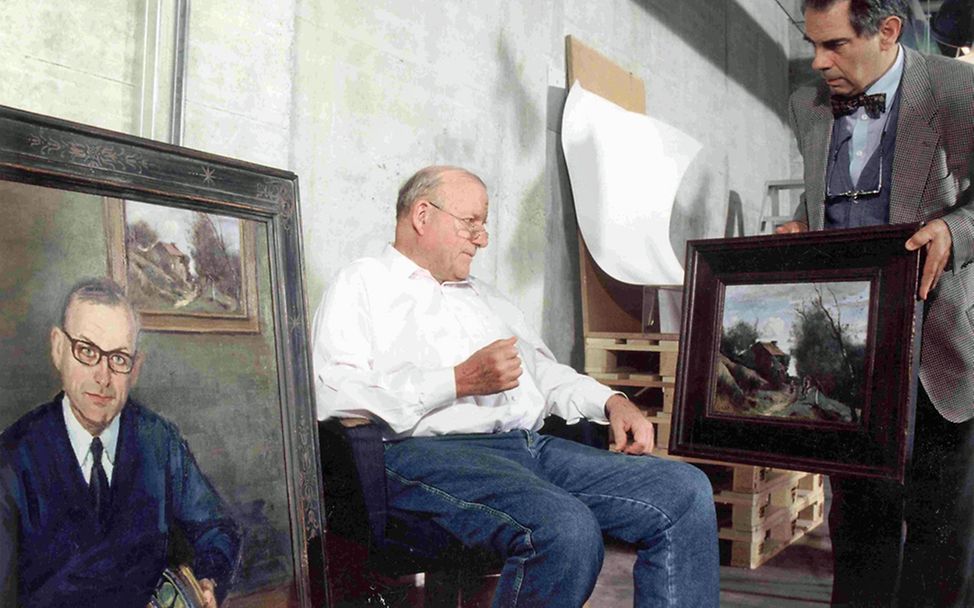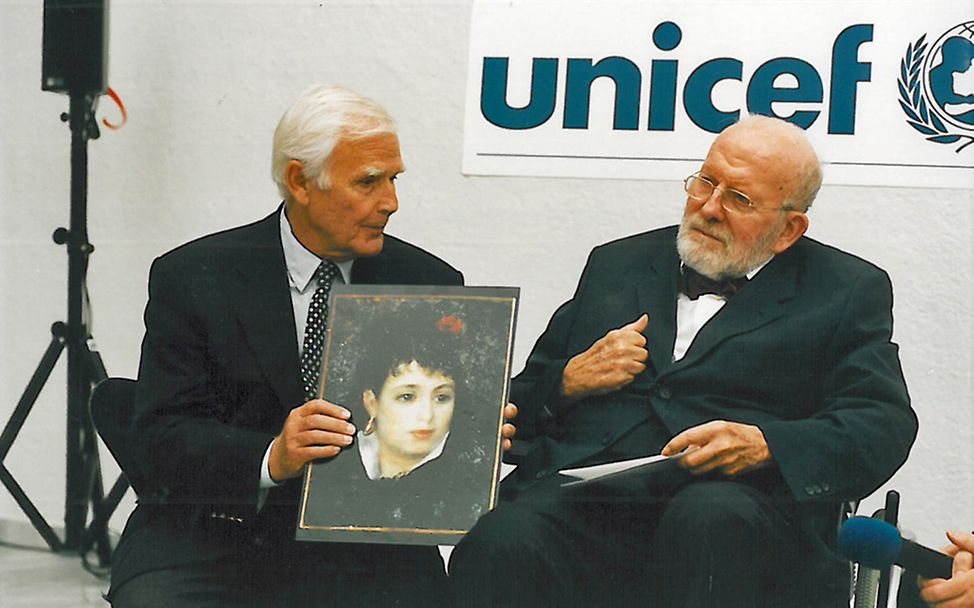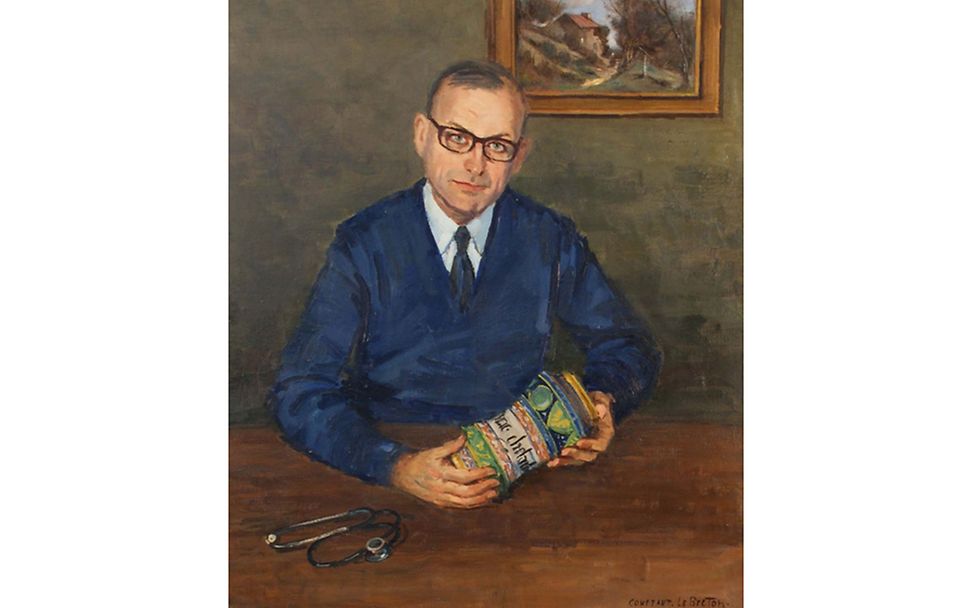
Biography Dr. Gustav Rau: Commitment to children in need
Part 2: Money’s there to help
Rau was a multi-millionaire and money mattered to him only in so far as it enabled him to help other people. “Apropos, I need a lot of money”, he wrote to his assistant in August 1989. “And Ciriri costs an awful lot of money: on Sundays, like today, the square underneath t. gr. tree resembles a gre[ek] agora, the only difference being that people went there not so much for food. At six o’clock in the morning when it’s still freezing cold they come, first the elderly who have n[ot] eaten since the day before, at our centre of course, then the mothers for the standard bouillie for themselves and the milk porridge for their children. And on it goes until the afternoon, across all ages, with many of them coming twice a day. We use up n[o] less than one ton of maize alone – and 1/3 ton of beans. Then the salaries, electricity, water, the medi[cine] for in- and out-patients whose turn it is at 11 a.m. und who are being treated for free because they would not be able to afford it anyway. Regarding the fees for primary school we have now reached 22,000 enrolled students for the school y. which starts in three weeks --- You see, I have to go to the limit and would like to touch the jewels in an abstract sense as late as possible. This is why I wo[uld] like to give away our 4th Pissarro as the first top-class painting – and then just about the whole arts and crafts.”

Bild 1 von 3 | Gustav Rau with works of his art collection in the warehouse of Embraport.
© P. Schälchli, Zurich.
Bild 2 von 3 | Gustav Rau handing over his collection to UNICEF Goodwill ambassador Joachim Fuchsberger.
© UNICEF
Bild 3 von 3 | A portrait of Dr. Gustav Rau - painted by Constant Le Breton 1973.
© GRUPPE Köln, Hans G.People always come first
His paintings were stored in the customs free warehouse of Embraport near Zurich airport in a subterranean safe, hidden from the public for years. In order to continue to help, Rau gave up the idea of building a museum in Marseille – the “gate to Africa” – or at least an exhibition hall in Embrach in Switzerland.
“On 1 January I made a final decision reg[arding] the further developments in Mars[eille] and Embr[ach],” he wrote his confidants on 4 January 1990. “…when there was rain and storm outside, and a miserable cold, and we had ar. 10,000 externals queuing up for food (next to our in-patients) which is distributed daily from 6.00 to 16.30 (cooking is being done 24 hours a day), to the effect that I will cease all work in M[arseille] and sell the whole art treasure to allocate the whole proceeds to the people here (or in other places of the Third World), if at all possible as long as I live. You will have noticed very well how much this decision has vexed me. Now it has become irrevocable. If I would have decided differently I would feel guilty.” He added: “I would have a sore conscience for the whole rest of m[y] days; the destitution here is beyond words.”
Beyond Africa
His own ailments and the civil war in Congo made it impossible for him to stay in Africa any longer. On 12 January 1991 Gustav Rau writes: “Without a compelling reason I do not want to continue the gypsy life (between Africa and Europe) which I am forced to live due to an existential choice of life… When I returned, I discovered a disastrous situation. … Prices are rising inexorably. In the city they are astonished that we still can cope with the steadily rising number of beneficiaries. … Now, in a few days the war will start. Horrible things will happen – and the consequences are unforeseeable. … Here in the city many shop windows are bricked up. It’s almost impossible to get medicine.” With a heavy heart he left Ciriri in 1993 and moved to Monaco.
When his health deteriorated his then lawyer tried to have him declared incompetent and to have his powers of disposal to his possessions removed. This was followed by a drawn-out legal action which, in 2000, was finally decided in Dr. Rau’s favour. In the course of the legal proceedings, the philanthropist decided to complete his humanitarian life’s work not through his foundations but through UNICEF Germany. Already in October 1999 he concluded the testamentary contract. Two years later, in anticipation of the testament, he endowed UNICEF the major part of his art collection. It was one of the biggest humanitarian donations in Germany.
“I now know my material possessions are in good hands”, he said when he handed over his collection on 4 September 2001 in Stuttgart. “I entrust them to an organisation that is committed to one cause only, to which I have given my own life: helping destitute children”. UNICEF Goodwill ambassador Sir Peter Ustinov who had met Gustav Rau several times before, said: “I haven’t met many great men in my life but Dr. Rau is certainly one of them. Whoever makes the effort to listen to him will be rewarded with insights of rare intelligence and great wisdom.”
Gustav Rau will be remembered
Shortly before his 80th birthday, Dr. Dr. Rau passed away near his hometown of Stuttgart on 3 January 2002. “He was concerned about my health as well as that of several thousand children. We saw this with our very own eyes. He was restless and never complained. He even carried sacks of 20 kg powder milk on his shoulders to feed the children of our people,” the former administrator in Ciriri, Dieudonné Cirhigiri Zirirana, remembers in his letter of condolence. “I saw how he would cross the hills in the rain and on foot lest he misses a meeting. I saw how he boarded a flight despite his broken foot to speak out on an important issue in Kinshasa. I saw him crying because of the pain and the poverty of a mother who came to see him for an examination. My whole experience of him was that of a man who would always give everything and who would never show weakness; just to offer his help.”
The bequest
After his death, UNICEF’s right to the inheritance was initially disputed. In August 2008, the district court of Konstanz rejected all complaints. More than 780 paintings, sculptures and handicrafts were transferred into the possession of the Foundation of the German Committee for UNICEF. UNICEF is using them as prescribed by Dr. Rau: core pieces will be on permanent loan until 2026 to the Arp Museum Bahnhof Rolandseck in Remagen. There, these art works are shown to a wide audience in temporary exhibitions from changing perspectives. The remainder will be sold under the guidance of art experts. The proceeds will be allocated to the UNICEF Foundation – for the children of the world. Already since 2011, UNICEF is conjointly cooperating with the Swiss based Foundation Dr. Rau, the legally acknowledged successor of any foundations Dr. Rau established in Switzerland earlier. The revenues from the estate are used to support the hospital in Ciriri as well as UNICEF programs in four African countries.
His last will
This was Gustav Rau’s last will: “For my whole life, in particular in the last few decades, I had this one deep desire: to help children in the Third World,” he said at the donation ceremony in Stuttgart in 2001. “I built a children’s hospital in the Republic of Congo and was able to help thousands of children. Knowing this is a source of great pleasure and solace. All the strength and the time I have left I used to build up and maintain my collection of art. I am very happy that this collection is being appreciated by art connoisseurs around the world. But also this collection was merely an instrument to an end, that is to say helping destitute and sick children in Africa or elsewhere in the Third World. Just for this reason I am happy that my collection has reached such an immense value.”